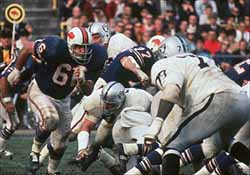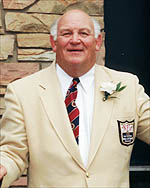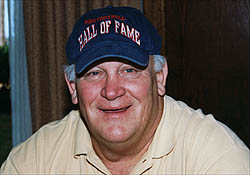
 |

Submit
a Question
Hall of Famer Q&A
Archive

Week
Seven: Billy Shaw
Enshrined in 1999
(Georgia Tech)
GUARD 6-2, 258
1961-1969
Buffalo Bills
First
player to spend entire career in AFL to be elected to Hall of Fame. .
.Two-way collegiate player. . .Drafted by Cowboys (NFL) and Bills (AFL).
. .Chose Bills to play on offensive line. . . Equally adept at pass blocking
and run blocking. . .Driving force behind offensive unit that led Buffalo
to back-to-back AFL titles in 1964, 1965. . . All-AFL five times. . .Named
to eight All-Star games
. . .Born December 15, 1938 in Natchez, Mississippi.
Question
& Answer with Hall of Famer Billy Shaw
October 25, 2001
 Mr.
Shaw - you went up against a lot of great players during your career.
Who would you say were the toughest guys to block? - Mark, New Jersey Mr.
Shaw - you went up against a lot of great players during your career.
Who would you say were the toughest guys to block? - Mark, New Jersey
BS: I'll have to start by all of them. The guy that gave me the
most trouble was a defensive tackle from the Boston Patriots by the name
of Houston Antwine. Houston was a tackle, was about six feet tall, weighed
about 280 pounds, had a very low sense of gravity and was very quick.
His first two or three steps or first moves were really quick, and he
gave me the most trouble of any defensive tackle that I played in front
of. In fact, the smaller tackle, although 280 pounds is not small, but
he was considered small. Tom Keating from the Raiders was in that same
mold. The big tackles, like Buck Buchanan or a Ernie Ladd didn't give
me as much trouble as the smaller, quicker tackle like Houston.
Dear Mr.
Shaw: What is your fondest memory of playing in Buffalo? - A fan in Lexington,
Ohio
BS: Well, I guess I'd have to say the fans. People think that I'm
crazy but I enjoyed the stadium that we had there. It was old and decrepit
and all the adjectives that have been used are correct. But, it gave you
a sense of intimacy because the fans were so close to you. And, in Buffalo,
the fans when they purchased a season ticket they kept that season ticket.
So, all of those folks that were behind our bench, as players we got to
know their faces, not necessarily know their names; but we would know
when they weren't at a game. And, I guess the closeness that the fans
and the team had back during the '60s - it was a joy.
Billy,
you played nine years in the American Football League. Which game do you
treasure the most, and also how did your training camp battles with defensive
lineman Tom Sestak help you to become a better player? -Matt Buffardi
BS: Well, the first part of that question - the game that I treasure
the most, of course, was the first AFL championship that we brought to
Buffalo - we played San Diego in Buffalo for the '64 championship. And
that was the Bills' first championship - that game stands out today and
of course I can remember plays in it and that's been many years ago. But,
I replay that game sometimes because it was such a joy.
Tom Sestak was probably one of the greatest defensive tackles to play
the game. I mentioned that a tackle by the name of Houston Antwine gave
me trouble. Well, that was on game day. Tom Sestak was by far the best
tackle that I ever played against. And we both came in close to the same
time - I was a year ahead of Tom. But, he was a couple of years ahead
of me as far as his ability to play the game. I learned to play the game
from the best. If I could stand toe-to-toe with Tom, then I could stand
toe-to-toe with anybody.
Billy,
I heard a story that claims your rehab program for your broken leg included
running the stairs at War Memorial Stadium. Is that true? - A Stadium
Vendor
BS: Well, first of all I didn't have a broken leg; I had a knee
injury - the ligament in my knee. And, that was part of my rehab was running
the stands at Buffalo. Yes, I got to know each step, had a name for each
step. And, that was my rehab.
Billy,
Every week, as we watch the NFL, more focus has been put on the offensive
linemen. Some linemen, like on the Denver Broncos are smaller, but quick
and use technique to do their jobs. Others teams, like the Arizona Cardinals,
have the bigger, stronger linemen that seem to work more on size alone.
From your perspective, in today's game, which type of lineman is more
effective? - Michael Alewine, Kansas City, Missouri
BS: Well, the rules have changed so it's kind of hard for me to
give a definitive answer to the question. Because of the blocking change
in the rules where today the hands and arms, and upper body are so important
to the technique. I still think that the smaller, quicker offensive lineman
has more to offer.
Mr. Shaw,
The Bills went from doormats in the early part of the 1960's to AFL champions
in 1964 and 1965. How did you as players establish a winning attitude
to reach the pinnacle of success, and what can the Bills of 2001 do to
learn from a dismal start? - Darrell E. Larocque, Virginia Beach, VA
BS: Well, I think we were fortunate enough in that we were a young
franchise and the Bills drafted extremely well in '61, '62, '63 so we
were there in the beginning together and we learned one another. And,
I think that the teamwork that we excelled in - both on the offensive
and defensive side of the ball - gave us the opportunity to win championships
in '64 and '65. And, we were in that championship again in '66 and we
tied for the Eastern Division title in '63 - so we had a four-year run
there and very few people changed in the makeup of the team. So, I really
believe that the ability to know who you could count on day in and day
out, year in and year out meant a great deal. That was all before free
agency and free agency today has destroyed a lot of the team concept.
An answer for the Bills today? I don't know that I have one except that
they are a young team and if they're able to stay together for a number
of years then they will reach that pinnacle again.
 Dear
Billy, What did you think of Bob Kalsu, personally and professionally?
I read the article about him in Sports Illustrated. How good was he in
your perspective and what could he have been had he played out his career
as a Buffalo Bill and not have gone to fight for the USA in Vietnam? -
Bill Hoffman, Prineville, Oregon Dear
Billy, What did you think of Bob Kalsu, personally and professionally?
I read the article about him in Sports Illustrated. How good was he in
your perspective and what could he have been had he played out his career
as a Buffalo Bill and not have gone to fight for the USA in Vietnam? -
Bill Hoffman, Prineville, Oregon
BS: Well, personally my opinion of Bob Kalsu is very high. Talk
about his character to begin with. He kind of set himself apart because
he had such character strengths. And, his choosing to go to Vietnam did
not surprise me at all because he was that kind of person. As a player,
and we played the same position, I viewed him as a threat. And, I say
that as a compliment because he was one of the few offensive lineman to
come in as a rookie that I felt had the possibility of upsetting either
me or the other guard - Joe O'Donnell - from our positions. He was a good
team player and he had all the tools to play the game. And, if he had
stayed in Buffalo, there's no question that he would at some point and
time become a starter and would have been a star lineman for the Bills.
Billy,
Describe the Jack Kemp/Daryle Lamonica relationship. How did it affect
the chemistry of the team? - Terry Sheehan, USDOT Volpe Center DTS-49
BS: Well, the Jack Kemp-Daryle Lamonica - people call it a controversy
but we didn't view it that way. They were two, entirely two, different
players. Both had great leadership ability. There was a time and a place
for both of them on the football field. I personally thought that Jack
could do as much or more with the ball as any quarterback that played
during that period. Daryle, on the other hand, was a very young quarterback
when he was with us. He believed in himself tremendously and that kind
of exuded into the attitude of the players around him. I dispute that
there was controversy because there really wasn't, they complemented each
other. Only those two guys can tell you how good of friends they might
have been. But, they were good teammates to play with, both.
Hello
Bill. You've played on the great Buffalo Bills teams of 1964 - 1965 &
1966. I think the Bills and one or two AFL teams could successfully compete
in the NFL at that time, what is your opinion? Richard Hansen, Pt. Pleasant.
BS: Well, we'll never know because we didn't get that opportunity
but I agree with you that our teams of '64 and '65 and '66, particularly
the '64 team and possibly the '65 team - we felt that we could have competed
with any team in football. And we did in the AFL and we felt the same
way as far as the NFL teams. We were all basically the same age, same
experience, and we were just brash enough to think that we could. And,
with Cookie Gilchrist in our backfield, we felt that we could play the
type of game that the NFL played and would have loved to have that opportunity.
Hall of Famer Q&A
Archive
Week
1: Frank Gifford
Week 2: Lem Barney
Week 3:
Willie Lanier
Week 4: Ken Houston
Week 5: Mike Ditka
Week 6: Paul Hornung

|




 Mr.
Shaw - you went up against a lot of great players during your career.
Who would you say were the toughest guys to block? - Mark, New Jersey
Mr.
Shaw - you went up against a lot of great players during your career.
Who would you say were the toughest guys to block? - Mark, New Jersey Dear
Billy, What did you think of Bob Kalsu, personally and professionally?
I read the article about him in Sports Illustrated. How good was he in
your perspective and what could he have been had he played out his career
as a Buffalo Bill and not have gone to fight for the USA in Vietnam? -
Bill Hoffman, Prineville, Oregon
Dear
Billy, What did you think of Bob Kalsu, personally and professionally?
I read the article about him in Sports Illustrated. How good was he in
your perspective and what could he have been had he played out his career
as a Buffalo Bill and not have gone to fight for the USA in Vietnam? -
Bill Hoffman, Prineville, Oregon